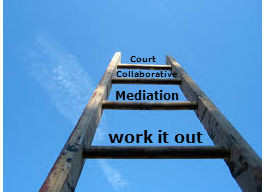You have options on how to finalize your divorce. And the costs will depend on the method you select. The Court fee for filing a divorce is approximately $395 and there is an additional recording fee depending on the county where the case is filed.
DO IT YOURSELF DIVORCE
You can download the Florida Supreme Court forms for free, fill them in with your spouse and file them yourselves and then proceed through the court process. The only cost is the filing fee. However, you must consider the length of time this will take you to prepare the forms without assistance and to process the forms through the court process which may take many months.
PARALEGAL DIVORCE
There are paralegal services that will help you fill in the Florida Supreme Court forms. These services cannot prepare any documents other than the standard forms and cannot offer any legal advice. They also cannot file the case for you and obtain the Final Judgment on your behalf. The costs for the assistance to prepare the forms is approximately $400 to $800.
FLAT FEE DIVORCE
My office can assist you in preparing all documents necessary to obtain a final judgment of dissolution. This includes a Marital Settlement Agreement drafted by the attorney and a Parenting Plan if necessary also prepared by the attorney. In addition, there are a number of pleadings that must be presented to the court will be prepared and presented to the Judge. We will then file the final documents necessary to obtain the Final Judgment on your behalf. In many cases this process can be completed in less than a month. The cost of this services is $2,000 for a divorce without children and $2,500 for a divorce with minor children.
MEDIATED DIVORCE
I am also a Supreme Court Certified Family Mediator and can assist you and your spouse to negotiate the terms of a Marital Settlement Agreement and Parenting Plan if you and your spouse are struggling with the terms. As the mediator I cannot file the final documents but can assist you through the process or refer you to an attorney to complete the process. The cost of this service is $350 per hour but the final cost will depend upon the number of issues to be addressed and the number of meetings necessary to resolve the issues. Each meeting last approximately two hours and normally there are on average between three to five meetings.
COLLABORATIVE DIVORCE
As an attorney with over twenty years of experience representing parties in divorce and paternity, I can represent you in a collaborative divorce process when there are more difficult issues to be decided. My fees for this representation of a party in a collaborative divorce is $400 per hour. This process also includes a neutral financial professional, a neutral facilitator and a collaborative attorney for your spouse. There are times when I am also selected as the neutral facilitator in the collaborative process and I charge $250 per hour for these services. While this process is certainly more expensive than the options above, it is much less expensive than the average fully litigated divorce. A comparison of the Collaborative Process for a case with minor children to a fully litigated divorce can be found here.
A LITIGATED DIVORCE
My office does not represent clients in this process. I stopped handling litigated divorces in 2012 after many years of assisting clients through this process. Part of the reason for this is the extreme costs involved which I did not find in my client’s best interest. Some cases require litigation to resolve the issues, but I strongly advise clients to consider if this is necessary and the costs involved. A comparison of the costs of a Collaborative Divorce and a Litigated Divorce can be found here.





